- Home
- Anthony DeCosmo
Beyond Armageddon: Book 02 - Empire Page 2
Beyond Armageddon: Book 02 - Empire Read online
Page 2
Trevor Stone.
Like the rest of them, his face had weathered the passing of time by growing harder, more resolved. War was their reality, their life.
Trevor held field glasses, too, and stood next to Shepherd.
“How are we doing this evening, General?”
“We shocked em’ and got em’ on the run. They don’t like it but they’re pulling out. About ten thousand of them with a handful fighting rearguard action.”
Trevor knew that more than fifteen thousand of his people—two mechanized divisions—led the assault.
Shepherd made the more important point: “The choppers got the ball rolling. They made the difference. Make sure you give Jon Brewer my thanks for that. In any case, I figure by dawn I’ll be able to present you with the city of Raleigh, North Carolina.”
“Good,” Trevor nodded in satisfaction. “I’ll add it to my collection.”
–
The three male members of the Dark Wolves unit gathered on the roof of the Sears building after spending the night camped in the old cosmetics department.
A haze remained over the battlefield, dulling the morning sun. The enemy armies had fled but scattered reports of gunfire rang out periodically as human forces moved through the debris. Overhead, a small helicopter buzzed by, and in the distance loudspeakers broadcast a message of freedom to the city’s slaves.
“Now that was tidy,” Oliver Maddock said, referring to the ruin of the Hivvan walls visible from their perch.
“Tidy?” Carl Bly replied. “I’d say that was just about the shit.”
“Oh, sorry chap,” Maddock rephrased as he understood his fellow commando did not recognize Welsh slang. “I should be saying, ‘excellent’ or something like that, for your sake.”
“Kiss my black ass,” Bly shot with a smile.
“Pucker up, sweetie,” the Welshman blew him a kiss.
Nina Forest joined the group. As usual, Odin obediently trailed behind.
“What’s the word, Captain?” Vince Caesar asked in his usual, straight-laced all-soldier way.
Nina told them, “The word is that the man himself wants to see us.”
“Again? Well isn’t that just swank,” Oliver said.
Caesar asked, “What about the bad guys? They all cleared out?”
Nina answered, “Nothing to it. Second Mech chased them a couple of miles out of town before running out of gas. Fast-movers are harassing their green asses as they run down forty.”
“Be-utiful,” Carl Bly quipped.
“What’s the man want?” Caesar asked, again with the all-business attitude drilled into him during his old world life with Marine Force Recon.
In other company, Caesar’s background might sound impressive, but among the Dark Wolves, his was just another resume to match Oliver Maddock’s five years in British SAS and Carl Bly’s tour as a U.S. Army Ranger.
In another world, it would be Nina Forest’s resume as a SWAT officer and National Guard pilot that would not have stacked up; certainly not enough to serve as element leader for the team. But Armageddon re-shuffled the deck. She had fought the Redcoats at Wilkes-Barre and she had fought in the legendary Battle of Five Armies; the battle that turned the tide.
In the four years since that great fight, she had fought in dozens of other battles and proved her worth by wiping out alien armies and extraterrestrial monsters. Indeed, her resume fit perfectly with this new world.
Nina smiled as she answered Caesar’s question, “I think we’ve earned some more jewelry.”
–
Completed in 1840, the North Carolina State Capitol building wore Greek Revival architecture including tall stone columns and an impressive dome sitting at the center of four distinct wings.
As Trevor and his entourage of human and canine bodyguards approached, he thought the building reminded him of the county courthouse back home in Wilkes-Barre, Pennsylvania but, then again, he figured most capitols would look familiar: politicians of old loved buildings that projected power and control.
Of course, the rest of Raleigh felt familiar for darker reasons.
He had seen it before. Richmond. Baltimore. Heavy Hivvan industry including matter transfiguration equipment; bulldozed or blasted houses replaced with alien domes; and of course, the hordes of malnourished, beaten human slaves who labored for extraterrestrial masters.
In the case of this city, they rescued nearly six thousand from pens and chain gangs and the bowels of the hideous manufacturing facilities. Many would die in the next few days from their wounds, disease, and lack of nourishment. Most would recover and take their place in man’s new nation.
Raleigh would be salvaged from the filth of alien occupation. It would take time to wash away the infection, but Raleigh would breathe life again some day and join the other places across the mid-Atlantic region freed by Trevor’s crusade.
General Shepherd’s 1st Mechanized Division still worked the streets flushing out Hivvan snipers and stragglers. As usual, the K9s—or Grenadiers—proved particularly helpful in sniffing out the enemy; the damn Hivvans stunk to high heaven.
A complete securing of every neighborhood would take several days. Yet for all purposes, Raleigh was a human place again, as evidenced by the energy Shepherd’s command post injected into center city.
A black and silver flag depicting a hand gripping an iron axe waved in the breeze outside the capitol entrance. Couriers and sentries, motorbikes and supply trucks raced to and from the magnificent old building making it the beating heart of the city’s liberation.
Furthermore, the ‘groupies’ of the two Mechanized Divisions in the city planted their temporary roots downtown. These were the mothers and fathers, husbands, wives, and children of some of the soldiers fighting in the front lines. They followed the advancing armies; a massive band of nomads living from covered wagons and tents, riding on horses and bikes, carrying heavy packs on their shoulders.
They existed as a city on wheels, building the needs of life then tearing them down in favor of the open road, then building again. Already Trevor saw latrines being constructed, temporary water reservoirs filled, cooking pots steaming atop open fires, barter merchants hanging their wears on racks in portable shops, and teachers gathering students in makeshift classrooms.
The supply lines would soon follow, too, bringing foodstuffs, medicines, munitions, and more from cities up north. Too many times those supply lines brought too little, but with each victory in the south came more growing fields, more grazing lands, more fuel resources, and more workers.
As Trevor walked toward the capitol building in the midst of a squad of bodyguards both human and K9, shouts of approval came from nomads, soldiers, and the stunned but now free people of Raleigh.
“Trevor!”
“You did them lizards really good!”
“Whoot!”
“On to Columbia!”
He acknowledged the cheers with a wave but kept moving. Much work remained; time did not allow for celebration.
Trevor and his group entered the building and made their way to the central rotunda where a copy of Canova’s original statue of George Washington in Roman garb grabbed his attention. Along the outer walls were a series of plaques and busts celebrating North Carolinian people and events of note such as likenesses of Samuel Johnston and Matt Whitaker Ransom, a copy of the Halifax Resolves, and more.
Despite the capitol’s prominent stature, the Hivvans had ignored it even as they had flattened much of the rest of Raleigh to make way for their bubble-shaped buildings and boxy industrial plants. A thick layer of disturbed dust floated in the air, eliciting sneezes from one of his bodyguards. Portable lights and sun slipping in from outside lit the chamber but the upper reaches remained dark.
The four-human Dark Wolves waited there, dressed in basic green BDUs with their four K9 compatriots by their side.
Unlike other ceremonies to decorate soldiers of note, no press accompanied Trevor this day, no news releases, and no
spectators. The Dark Wolves were to remain a mystery not only to the aliens they hunted but also to the fledgling post-Armageddon nation for whom they fought.
This served Trevor’s purpose for a variety of reasons. Occasionally the press caught wind of some invincible commando unit acting as Trevor’s sword, reaching out and striking humanity’s enemies. Whispers of their deeds boosted morale far greater than could be gained by unmasking these agents. Besides, he liked to keep people thinking that no matter the situation, Trevor Stone always held an ace in his hand.
When the commandos saw Trevor enter the chamber, they snapped to perfect attention. General Jerry Shepherd stood by their side.
Trevor addressed the soldiers, “It seems this is becoming a habit. Captain Forest, once again you and your team have taken on a difficult task successfully. Your work here was the tip of the spear in wiping out our enemies in Raleigh. Thousands of your fellow human beings are now free because of you. Congratulations seems…well, it seems an understatement.”
General Shepherd handed Stone a case holding tiny gold emblems in the shape of broadswords. One by one, Trevor pinned a golden sword on their chests and shook their hands. He came last to Nina Forest. Her icy blue eyes offered only the most diligent of respectful stares.
It had been more than four years since the Battle of Five Armies. More than four years since they had discovered the implant in Nina’s brain. More than four years since Reverend Johnny removed that vile parasite. And when he removed it, he removed a year’s worth of Nina Forest’s memories.
A year of fighting alongside—and sometimes with—Trevor Stone. A year during which she discovered there was more to her than killing; that she could show compassion; that she could love Trevor.
At one time, it seemed destiny chose them as a match for eternity. Neither had ever before known the scope of feeling, the intensity of passion, nor the openness they had yielded to one another during those months together.
Then those days vanished.
That Nina Forest—the one who had found so much of her own soul by sharing it with Trevor—no longer existed. With her memories wiped clean, he occupied a different place in her heart: the place of respected leader.
He lost the one person he truly loved, the one person with whom he could drop the front and be merely a man.
So there Trevor stood, inches from the person he had once embraced with all his heart. And oh, how he longed to be with her again; yet he had been told by his mysterious benefactor that their relationship was not to be. The handful of people who knew the truth were banned from speaking of it. Such talk would be the talk of treason. The forces of Armageddon had warned Trevor that he did not belong with her, and so he dared not risk such revelations.
He did his best to keep his hand from shaking as he pinned the medal on her uniform.
Yet little did he know that she shook, too. She trembled out of respect for him. Out of respect for all the places he had taken them. From a tiny corner of Pennsylvania they had grown into an army—a nation—taking back their planet from the invaders one mile at a time.
Whatever he commanded, she would do. Wherever he needed her to be, she would go. He gave her purpose; gave legitimacy to her natural talent for destruction.
Trevor Stone backed away from the small formation and raised his hand in salute.
“Thank you for all you have done and how well you have done it. I know that I can count on you. I know mankind can count on you.”
Shepherd dismissed the unit.
Trevor watched them leave.
He watched her leave.
2. Observations
Four and a half hours after decorating Nina Forest and the Dark Wolves, Trevor Stone waited inside his personal “Eagle” airship as it sat idle just beyond the earthen walls of old Ft. McHenry at the mouth to the Inner Harbor of Baltimore.
Outside, ground crewmen wearing jeans and shorts but going shirtless in the heat affixed a thick hose to the refueling port in one of the aft landing gear pods. That hose stretched across the grassy grounds to the bay waters after passing through a large silver desalination tank. The Eagles—stolen from the alien invaders nicknamed ‘Redcoats’ after the Battle of Wilkes-Barre—flew on hydrogen-powered engines fueled by H20.
Inside, Stone sat in one of a dozen leather seats situated in rows along one wall of the passenger compartment. Most of the Eagle air ships included another row of seats on the other side but this was Eagle One; a command ship modified into a mobile tactical control center. Individual chairs paired to work stations for communication, data, and asset tracking replaced that second row of seats, although on this trip those stations sat empty.
Trevor Stone waited alone with the exception of the Norwegian Elkhound named Tyr; his family dog since long before Armageddon.
The steady drone and thump of the pumps continued as the refueling process dragged on. Trevor drummed his fingers on his thigh in an anxious fit; he did not like sitting around doing nothing, not with so much going on. The Hivvan front dominated his thoughts but many things competed for attention. Every step forward created new issues and as the sole authority governing humanity’s comeback, those issues rested on his shoulders.
He tried to think of other things, pleasant things. He thought about the Eagle air ships and how humanity now built their own, improved versions of the craft. The “Eagles” were now better armed and fitted with upgraded communications systems.
The ‘humanized’ version of those ships originated from the old naval shipyard in Philadelphia. In the last two years, that facility manufactured nearly two dozen. With their vertical take off/landing capability, the Eagles provided a unique mode of transportation that did not tap fuel supplies and could be modified to serve a variety of purposes.
Of course, none of that would be possible without the re-opened and re-configured steel facilities in Bethlehem, PA. Those haunted old plants operated again thanks to matter transfiguration machines stolen from the Hivvans, first from a crashed ship in Pennsylvania and then larger units from facilities in Washington and Richmond.
Now that Raleigh had fallen, more of the machines would be at their disposal but the victory also meant thousands more people to feed and shelter, which meant the supply trains needed to run even faster but with so many attacks on stations and tracks in recent months that was hard to—
The side door slid open, mercifully breaking Trevor’s frustrating circle of thought.
Four soldiers wearing the best available equipment—green fatigues, body armor, and M16s—walked inside and found seats.
A fifth man entered wearing a blue flight suit, blond hair, and glasses.
“Thought you’d like something to read,” Rick Hauser—Trevor’s personal pilot—said as he handed his boss a crude newspaper.
Trevor accepted the paper and consulted his watch. He figured they would be at the estate sometime shortly after nightfall, meaning Jorge would still be awake and hence Trevor could tuck his son in to bed tonight.
Hauser disappeared through the cockpit door just as the drone and thump of the refueling process ended. A few moments later, Trevor heard the hum of spooling engines, then felt the craft effortless lift into the air thanks to the anti-gravity circuitry in the undercarriage.
He held a copy of The Baltimore New Press, one of a half-dozen fledgling newspapers that joined an on-again/off-again AM band radio station and a couple of regional television outlets as the rebirth of the news media.
It was today’s edition: August 18. Five years and two months since the first monsters and aliens came to his world.
The paper spanned ten pages printed in broadsheet with grainy photos and error-filled prose. Still, Trevor admired their tenacity and, admittedly, found he liked this post-invasion version far better than the old world’s media. The new press included hard reporting and lots of hustle but no damn stories about rock stars marrying actors or sex scandals in Hollywood.
The headline blared: “RALEIGH IS OURS!”
&
nbsp; As of this morning, Raleigh, North Carolina belongs to mankind once again. The First and Second Mechanized divisions smashed through the perilous city defenses and routed the Hivvan garrison. Word has it that the one and only “Stonewall” McAllister led the assault on horseback. More interestingly, the imposing enemy gun emplacements and their defensive walls tumbled moments before the main assault. Rumor has it that the same mysterious commando unit that assassinated the Hivvan regional governor in Richmond last year was behind this sudden strike.
The alien army that once ruled all of Virginia and North Carolina continues to retreat as the fighters of humanity strike yet another lethal blow against the invaders. Some of the soldiers chanted “On to Atlanta!” Atlanta being the heart of the Hivvan holdings on Earth.
Trevor smiled and imagined how the LA Times or NY Post would have covered such a story years before. The first paragraph would have speculated about undo civilian casualties, openly wondered if the Hivvan strength had been overstated, then provided a military “expert” to lash out at the tactics and strategies used.
Things had changed for the better, to Trevor’s mind.
He never tried to influence the press. Even if he wanted to, he simply did not have the time. Nonetheless, the new media remained supportive of the cause, probably because that cause had freed many of them from slavery or starvation.
Stone paused as he remembered one exception to the ‘supportive’ rule. Still, he would not let that bother him. He read on and enjoyed the glowing report of rescued slaves, crushed enemies, and the bravery of his soldiers.
Another page in the Baltimore New Press offered a rough sketch of the eastern third of what had once been the United States.
The areas liberated by Trevor’s armies were colored white in the sketch, including all of Pennsylvania, all but the northeastern parts of New Jersey, the southern half of New York state including key spots along the Hudson, all of Delaware, Maryland, and Virginia west to the Appalachian Mountains. The northern most third of North Carolina was now white, too.

 Opposing Force: Book 01 - The God Particle
Opposing Force: Book 01 - The God Particle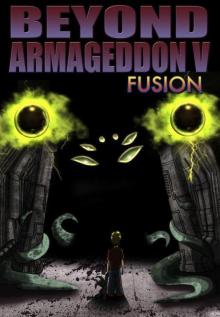 Beyond Armageddon: Book 05 - Fusion
Beyond Armageddon: Book 05 - Fusion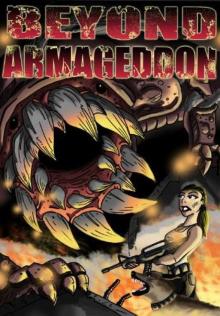 Beyond Armageddon: Book 01 - Disintegration
Beyond Armageddon: Book 01 - Disintegration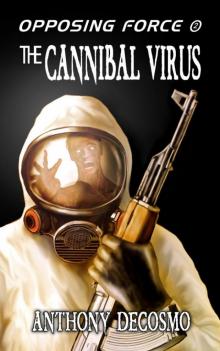 The Cannibal Virus
The Cannibal Virus Project Sail
Project Sail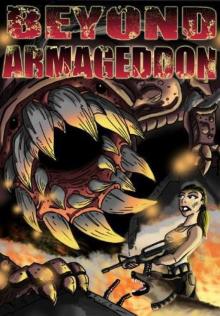 Disintegration ba-1
Disintegration ba-1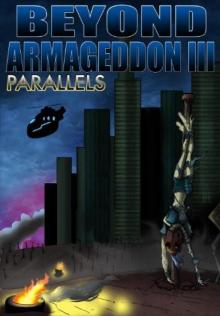 Beyond Armageddon: Book 03 - Parallels
Beyond Armageddon: Book 03 - Parallels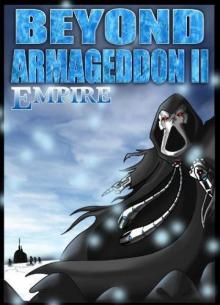 Empire ba-2
Empire ba-2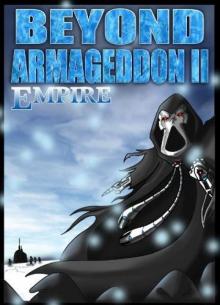 Beyond Armageddon: Book 02 - Empire
Beyond Armageddon: Book 02 - Empire